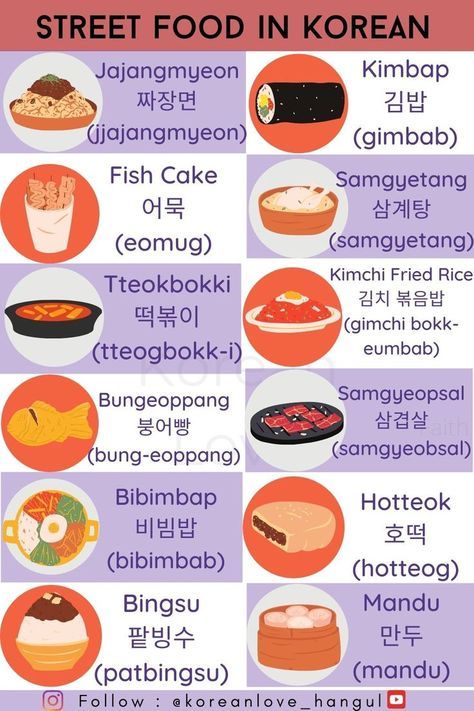#learning Hangul
Text
google drive of free korean language learning resources
hi everyone! because i put tutoring on hold while i am working full time but still want to provide help to those who want to start learning/want to practice their korean, i am continuously compiling material for free learning :)
resources are totally free!
most are typically aimed at children (which is great for beginners!!)
hangul practice
vocabulary building
printable/downloadable
example of scans:
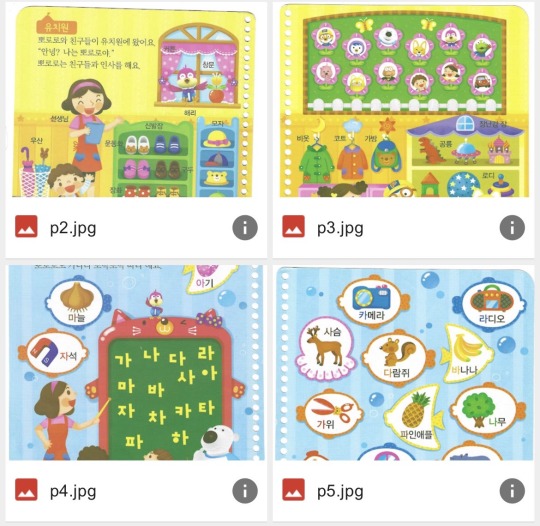
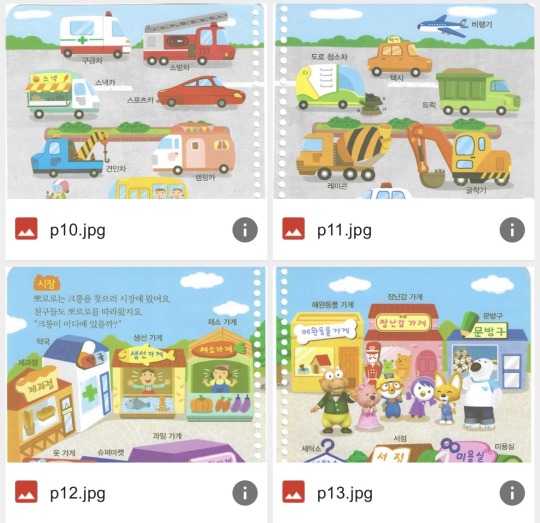
example of grammar breakdowns:
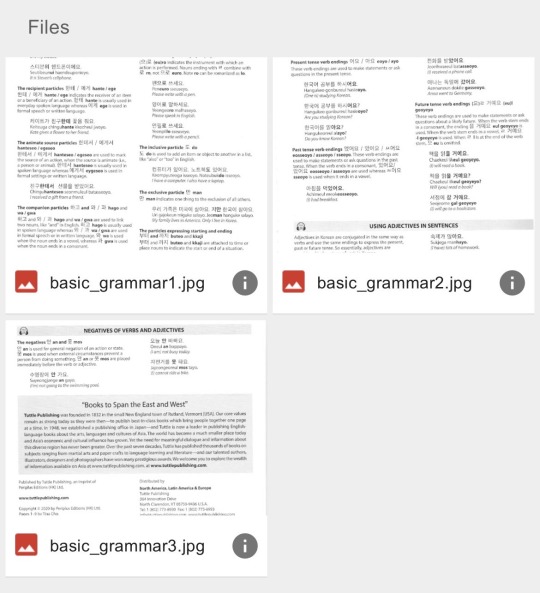
i will be adding material over the coming weeks and continuously as i come across material! updates may be frequent or slow down at times.
note: resources are free, and they’re totally free to share and use! but please do not repost without credit, and because i buy these from my workplace with my own money and spend time scanning them and cleaning them up and organizing them, please consider tipping me as much as you’d like ♥️
here is the link to the drive! (sorry, can’t hyperlink on mobile currently)
enjoy, and thank you in advance! have fun and feel free to ask me any questions—i am a korean studies grad and was a tutor for the beginning korean classes at my university. i am happy to help however i can!
♥️ joey
#ok about to tag the hell out of this sorry in advance#studyblr#study korean#korean#learning korean#hangul#learning hangul#beginner korean#korean study#korean studyblr#korean study notes#한글#한국어 공부하기#한국어공부중#한국어 배우기#korea#korean langblr#korean language#resource#language resources#korean learning#korean learning resource#OK ANYWAYS feel free to reblog like etc#just want to provide some help :)))
2K notes
·
View notes
Photo
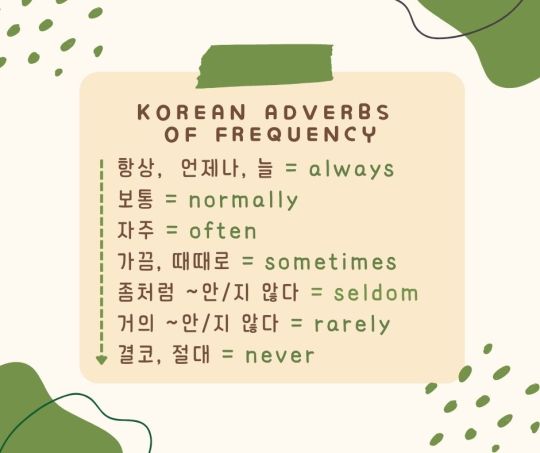
𝐊𝐨𝐫𝐞𝐚𝐧 𝐀𝐝𝐯𝐞𝐫𝐛𝐬 𝐎𝐟 𝐅𝐫𝐞𝐪𝐮𝐞𝐧𝐜𝐲
- 항상: 라면을 항상 먹어요. = I always eat ramen.
- 보통: 라면을 보통 먹어요. = I usually eat ramen.
- 자주: 라면을 자주 먹어요. = I often eat ramen.
- 가끔: 라면을 가끔 먹어요. = I sometimes eat ramen.
- 좀처럼 ~안/지 않다: 라면을 좀처럼 안 먹어요. = I seldom eat ramen.
- 거의 ~안/지 않다: 라면을 거의 안 먹어요. = I rarely eat ramen.
- 절대 ~안/지 않다 : 라면을 절대 안 먹어요. = I never eat ramen.
-
Kindly Visit My Blog Here
Available Products Here
Available Korean Writing Notebook Here
#learn korean#studying Korean#Korean Language#learning language#korean adverb#한국어능력시험#한국어#한국어 배우기#한국어 단어#study with me#frequency#adverbs of frequency#한국어 공부하기#한국#hangul#learning Hangul
145 notes
·
View notes
Text
Study Korean with me - Informal
• 네(Ne)-Yes.
• 아니(ani)-no.
• 정말/진짜(Jeongmal/jinjja)-Real/really.
• 괜찮아(Gwaenchanha)-it's Okay.
• 몰라/모르겠어 (Molla/moreugesseo)-I don't know.
• 알았어(arasseo)-okay,I got it.
• 알아(ara)-I know.
• 아이고(aigo)-Aww.
• 오모/ 헐/깜짝이 (omo/Heol/kkamjjaki)-OMG.
• 세상에 (sesange)- World / Oh my Goodness.
• 안돼(andwae)-No~.
• 말도안돼(maldo andwae)-No way.
• 싫어(shirho)-No!/Hate.
•재밌어서?(Jaemisseoseo)- is it Fun?.
• 재미있지 않아/노잼(jaemiittji anha/no jaem)-that's no fun.
• 재미있네(jaemiittne)-that's fun.
•꿀잼(kkuljaem)-Cool fun.
• 따라해(ttarahae)-Follow me.
• 살려좀 (Sallyeo jom)-Save me.
• 도와좀 (dowa jom)-Help me.
• 그만해(Geumanhae)-Stop.
• 나와(nawa)-Come out.
• 왔어(wasseo)-you’re here.
• 나가 (naga)-get out.
• 돌아와(Dorawa)-Come in/Comeback.
• 빨리 (ppalli)-faster.
•잠깐만(jamkkanman)-wait.
• 근데 (geunde)-by the way <Transition>.
• 아무튼 (amuteun)-anyway.
• 짜증나 (jjajeungna)- annoyed.
• 그래 (Geurae)-Oh okay….
• 정답 (Jongdap)-Answer/Correct.
• 땡 (ddaeng)-Wrong.
• 할 수 있어 (hal su isseo)-you can do it.
• 수고했어(sugohaesseo)-you did well.
• 미쳤어(michyeosseo)-crazy.
• 없어(eopseo)-Nothing.
•알겠어?(algesseo)-do you understand?.
•좋은 아침(joheun achim)-Goodmorning.
•좋은 저녁(joheun jeonyeok)-good evening.
•이해 못해(ihae mothae)-I don't/can't understand.
•축하해(chukhahae)-congrats.
•아파(apa)-hurts.
•행복해(haengbokhae)-happy.
•사랑에 빠졌어(sarange ppajeosseo)-I'm inlove.
•짝사랑(jjak sarang)- Crush/one-sided love.
•지루해(jiruhae)-bored.
•피곤해(pigonhae)-tired.
•무서워(museowo)-scared.
•바빠(bappa)-busy.
•슬퍼(seulpeo)-sad.
•신나(shinna)-excited.
•비싸(bissa)-expensive.
•싸(ssa)-cheap.
•어떻게(eotteohke)-how.
•어떡해?(eotteokhe)- What should I do?.
•다시(dashi)-again.
•말해(malhae)-say /tell/speak.
•안(an)-in.
•밖(bakk)-out.
•다른(dareun)-different.
•똑같아(ttungkata)-look like, To seem like.
•뚱뚱해(ttungttunghae)-fat.
•마르해(mareuhae)-thin.
•추워(chuwo)-cold <temperature/weather>.
•더워(deowo)-hot <temperature/weather).
•뜨거워(tteugeowo)<something that is very hot>.
•똥(ddong/ttong)-poop.
•오줌(ojum)-pee.
•대박(daebak)-Awesome.
•짱(jjang)-The Best.
•얼짱(eoljjang)-Best Face/Pretty Face.
•몸짱(momjjang)-Best Body.
•사차원(sachawon)-4D/Wierd personality.
•너나 잘해(neona jalhae)-Mind your own business .
•뻥이야/장난이야(ppeong-iya/jangnaniya)-Just kidding .
•뻥치지마(ppeongchijima)-Stop joking.
•초딩(choding)-Childish.
•콜(kol)-Sure.
•아싸(assa)-Yay/Yeah[It depends on the situation] .
•멘붕(menbung)-Mental breakdown.
•화이팅/파이팅(hwaiting/paiting)-Fighting .
•당연하지(dangyeonhaji)-Of course
11 notes
·
View notes
Text
it’s been 12 days and i have 7,578 xp on duolingo. 5,044 of which is in Korean… my friend who has a 113 day streak has 7,917 xp… i think i need to tone it down a bit (but i won’t because i love placing first in all the leagues)
#language#learn korean#learning korean#learning languages#study korean#studying korean#hangul#learning hangul#study hangul#study languages#duolingo#language learning#korean language#korean vocabulary#한국어
4 notes
·
View notes
Text
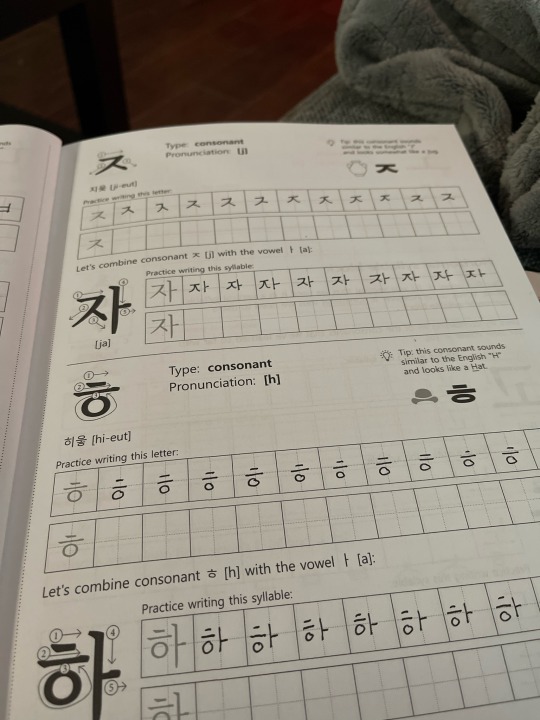
More Hangul practice today!
0 notes
Text
One-Page Masterlist
안녕하세요! Hey everyone! I recently got an ask about my old masterlist, which is the same as my broken-down masterlist except it has all of my lessons on one page, rather than on multiple separate posts. Some may find this expanded version easier to navigate, so I’ll keep this up for y’all! My broken-up masterlist, of course, will still be available for those who find that more helpful :)
Hangul Lessons
Consonants
Vowels
Writing/Reading Korean Syllables
Some 받침 Rules
Diphthongs
Stroke Order
Some More 받침 Rules
Irregular Verbs
The Basics
Common Phrases
Numbers
Sino-Korean vs. Native Korean Numbers (Instagram Post)
Sentence Structure and Particles
Present-Tense Conjugations and Formal Language
Adjectives
Questions
Honorifics and Casual Language
Beginner
Negative Sentences
잘 and 못
Past Tense
Future Tense (-ㄹ / 을 것이다)
-ㄹ / 을 까요? (Shall we…? / I wonder…?)
-(으)세요 (Giving Commands / Asking Questions)
Telling Time
-고 싶다 (I want to…)
How to Say “And”
-지만 (However)
아/어/여서 (So…)
Negative Commands
Spacing (띄어쓰기)
Adverbs
ㅂ Irregular
Comparatives and Superlatives
난, 날, & 내가
Upper-Beginner
-(으)면 (If…)
아/어/여도 (Even though…/Even if…)
(으)면 되다 / 아/어/여도 되다 (I can…/You may…)
-아/어도 되다: Asking for and Giving Permission (Instagram post)
-(으)면 되다 & -(으)면 안 되다 (Instagram post)
아/어/여야 되다 and 아/어/여야 하다(Have to / Should)
Present Progressive (-고 있다)
How to Say “Or”
-아/어/여하다
All About 중
How to Use -(으)로
Before & After
-ㄴ/은 채로
Intermediate
Describing Nouns with Verbs (-는 것)
Describing Nouns with Verbs - Past & Future Tense (-ㄴ/은 / -ㄹ/을 것)
Nominalization
것 같다 (I think… / It seems…)
-러 가다 / -러 오다
-(으)려고 (In order to…)
-기로 하다 (to Decide to do Smth)
척하다 (To Pretend)
-게 되다
-군요 / -구나
아/어/여 보다 (to try…)
-은/ㄴ 적 있다 / 없다 (I have / have not)
-ㄹ/을 게요 (Future Tense)
겠다
-ㄹ/을 수 있다/없다 (I can / cannot)
-ㄹ/을 때 (When…)
-ㄴ/는다면 (If)
-(으)면서 and -(으)며
-(으)니까 (Because / So)
-아/어/여주다
-(ㄴ/는)다 (Narrative Form)
Quoting
Let’s…
Quoting continued
(으)ㄹ래요? (Wanna…?)
-죠
-대로
More Quoting - 대 & 래
잘하다 & 못하다 vs. 잘 하다 & 못 하다
-아/어 가지고
-(으)려면
-는 길에 & -는 길이다
-(으)면 vs. -ㄴ/는다면 (Instagram Post)
-았/었을 것이다
-느라고
-는 데(에)
-ㄹ/을 뻔하다
Upper-Intermediate
-ㄴ/는데
-(으)ㄴ/는지 (Whether or not)
-(이)라는…
All About 아무리
-잖아요
Expressing Surprise
-시 (Honorific)
Making Comparisons
-아/어/여지다
I might…
So that…/To the point where…
Causative Verbs
시키다
Passive Verbs (part 1)
Passive Verbs (part 2)
-ㄴ/은가 보다 & -나 보다 (I guess…)
-ㄹ/을수록
Other Meanings of 싶다
-자마자 & -는 대로(As soon as…)
-긴 하다
-치고
-김에
차라리 (Rather)
-(으)ㅁ Nominalization
-기는 무슨 & -기는 개뿔
-고 보니까
-듯(이)
버리다
-(으)면 좋겠다 & -(으)면 하다
-길 바라다
Advanced
-거든(요)
-줄 알다/모르다
-ㄹ/을 테니까 and -ㄹ/을 텐데
-았/었던
아니라 and 대신에
-ㄹ/을 리가 없다
편이다, 별로, and More
-지 그렇다 (Why don’t you…?)
-ㄹ/을 걸
-ㄹ/을 까 보다
-다면서요
-다니 part 1
-다니 part 2
뜻이다 & 말이다
-다가
-더라고(요)
-더니
Some colloquialisms: 아니시에이팅 and 뭐 이렇게
-(으)ㅁ Sentence Ending
-다 보니까
What does 따위 mean?
-ㄴ/는데도
Korean Idioms
Vocabulary
Must-Know People
Must-Know Places
Must-Know Things
Must-Know Verbs
Must-Know Adjectives
Countries
Months, Days of the Week, and More
Clothing (옷)
School (학교)
Autumn (가을)
Autumn (w/Pictures!)
More Questions
House / Apartment (집 / 아파트)
Emotions / Feelings ( 감정)
Animals (동물)
Loan / Konglish Words
Food and Drink (먹을 것과 마실 것)
Parts of the Body (몸)
Counters
Modes of Transportation (교통 수단)
Colors (색깔)
Colors (with Pictures!)
Weather (날씨)
Winter (겨울)
Music & Instruments (음악과 악기)
Baking Gingerbread Cookies
Emergency (비상)
Hygiene & Bathroom (위생 & 화장실)
Indefinite Pronouns
Work / Office (일 / 사무실)
Spring (봄)
Coronavirus Prevention (코로나바이러스 방역)
How to Wash Your Hands (손을 씻기)
Time (시간)
Korean Cuisine (한식)
Summer (여름)
Summer (여름) w/Pictures!
Graduation (졸업)
Identity (독자성)
Korean Text Slang
Similar Words
Makeup w/Pictures! (화장품)
Family (with Pictures!)
Pronouns
How to Say “Still” and “Already” in Korean
Tastes & Textures (맛과 질감)
K-Pop Audition
K-Pop Fandom Terminology
Different Ways to Say “Change”
Flower Names
What Does 원래 Mean?
What does 오히려 Mean?
College
Hanja Lessons
최
수
악
식
급
동
부 & 불
애
출
퇴
예
음
중
학
습
연
생
대
입
인
문
감
과
원
특
만
후
무
Charts
Present, Past, and Future Tense
Question Words
잘 vs. 못 and Negative Conjugations
Future Tenses
-았/었던 vs. -던 (at end of lesson)
Particles
Some 받침 Rules
Gifving Commands
Conjunctions and -아/어/여서 vs. -(으)니까
-(으)면 vs. -다/라면 and Different Ways to Say “And”
How to Say “Or” (at end of lesson)
Telling Time (at end of lesson)
Comparatives and Superlatives
잘하다 & 못하다 vs. 잘 하다 & 못 하다 (at end of lesson)
Comparing 잘하다/못하다, 잘 하다/못 하다, & 수 있다/수 없다
Irregular Verbs
Pop Quizzes
Level 1
K-Pop Breakdowns
TXT - “Cat & Dog”
Twice - “Feel Special”
Enhypen - “Fever”
2NE1 - “Go Away”
Lee Hi - “Only”
“기억을 걷는 시간 (Time Spent Walking Through Memories)”
KCM - “An Old Love Story (흑백사진)”
Taeyeon - “Can’t Control Myself”
Epik High - “Lost One”
Colde - “A Song Nobody Knows”
IU - “My Sea”
Enhypen - “Polaroid Love”
유라 (youra) - “하양 (RAL 9002)″
BTS - “Ddaeng”
Stray Kids - “For You”
Woozie - “어떤 미래 (What Kind of Future)
TXT - “Eternally”
LOONA - “Heart Attack”
Stray Kids - “Muddy Water”
LOONA - “Girl Front”
Pentagon - “Daisy”
BTS - “Sea”
Semester in SK
Nami Island (남이섬)
Things to Buy at Daiso
Shopping Phrases
Ordering Coffee
Signs in Korea
Ordering at a Restaurant
Riding the Seoul Subway
Things at the 편의점
Korean Curse Words
Etiquette in South Korea
Drinking Culture
Hanja in Real Life
Holidays in South Korea
Korean Cuisine
Concert Ticketing in South Korea
K-pop Comebacks in Korea
Summer in South Korea
What I Learned
#korean#korean language#hangul#korean grammar#korean vocab#korean vocabulary#learn korean#learning korean#langblr#Korean langblr#masterlist#apok#apopofkorean#study korean#studying korean#kpop#kpop lyrics#basic korean#beginner korean#intermediate korean#advanced korean#hanja#한국어#한글#한자#한국어 공부하기#한국어 배우기#한국어 문법#한국어 어휘#초급 한국어
2K notes
·
View notes
Text
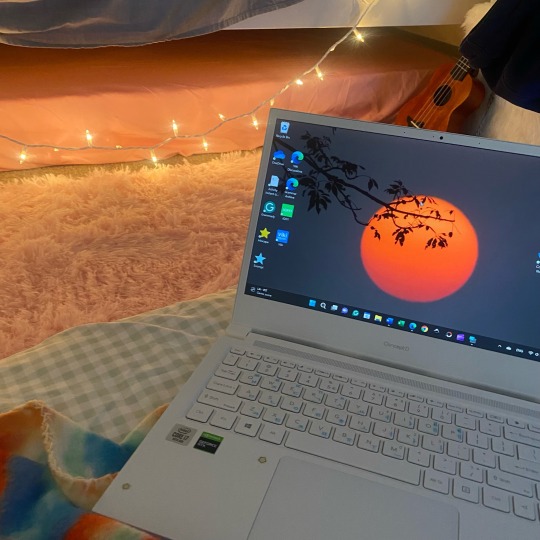
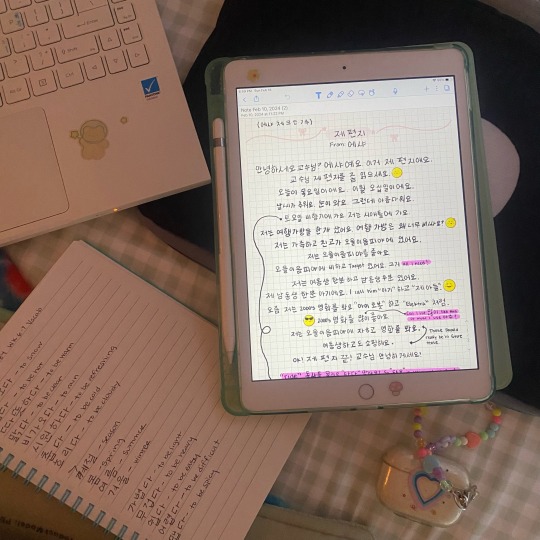
2.18.2024 — 오늘 제 여동생의 방에서 공부해요. 저는 너무 바빠. Besides the chapter quiz, which should really only take 십오 minutes or less, I’m literally taking the day off of work and studying to run errands and clean. 근데, 저는 책상을 샀어요. I’m sort of excited, mostly to decorate my space. It’s pretty small, but I’ll make it my own. Midterms are this week along with normal course work, so here we go!
#college student#studying#korean language#studyblr#language student#language study#studying at home#online student#student#language learning#study blog#study motivation#studying inspo#learning korean#student life#studying korean#hangeul#hangul#college work
184 notes
·
View notes
Note
Do you think one could attain decent-ish ability to read Japanese just by studying kanji? Specifically asking because the kanji learnin' service "wanikani" is the single Japanese resource that works best with my brain, but then there are separate resources for grammar and vocab and and and.....
You will get REAAAALLLLLYYY far knowing only the kanji but you're going to have to know hiragana and katakana at some point too. Tofugu, the company that did Wanikani, has two mnemonics-based guides for the kana that are basically Wanikani Lite. They're how I learned the kana and I swear by them.
Here's hiragana: https://www.tofugu.com/japanese/learn-hiragana/
And katakana: https://www.tofugu.com/japanese/learn-katakana/
Hiragana are especially vital to learning kanji; you won't be able to use 99% of Japanese-English dictionaries without them. BUT they're pretty easy and the rules for using them are consistent. You won't have to remember any irregular exceptions for any of them.
I haven't tried it yet, but I've heard really good things about the Crystal Hunters manga series as a fun/low stress way to learning Japanese vocab and grammar. It eases the reader into new concepts and then repeats them throughout the chapter so you remember them. There are free vocab and study guides/lists for each chapter too. Might be worth checking out once you get some kanji and the kana under your belt? The first book is also free.
Official site: https://crystalhuntersmanga.com/
Good luck!!
#asks#Japanese takes like a bajillion hours forever to learn because of the 2200+ kanji lol...........#But it's sooooo consistent grammatically and with the spelling. I love it#Kinda spoiled me tbh. I look at English now and I'm like#'Why can't you be more like this. Why are you such a mess. Get your act together'#And then there's Korean's hangul writing system. It's SO BEAUTIFUL. Actual marvel of linguist engineering#The Japanese lexicon is also a lot smaller than English's too. Which is both a blessing and a curse#Less words = quicker to learn. BUUUUUTTTT less words that mesh well with English. Translation is hard!!!#Holy fuck. Ok so Wikipedia says that the English language has 755`865 words as recorded by Wiktionary#and Japanese has 500`000 according to Nihon Kokugo Daijiten#BUT THEN KOREAN. ACCORDING TO ONLINE DICTIONARY URIMALSAEM (open source dictionary) HAS 1`149`538 WORDS#The biggest lexicon is Tamil's with 1`516`952 unique headwords as recorded by online dictionary Sorkuvai#That's absolutely nuts#I got massively distracted. Enjoy my word vomit tags
37 notes
·
View notes
Text
ART HISTORY WORD LIST
I'm slowly reading a book called 청소년을 위한 한국미술사 (Korean Art History for Youth). In the process I came across many interesting terms that may be useful for those who are interested in Korean art and history and maybe would like to read about such topics in Korean in the future. So I decided to share the vocabulary list. Perhaps, to be continued.
선사 [先史] - prehistory
도안 [圖案] - design
암각화 [巖刻畵] - petroglyphs
청동 [靑銅] - bronze
빗살무늬 토기 - comb-pattern pottery
유물 [遺物] - relic, artifact
미의식 [美意識] - aesthetic sense
창의력 [創意力] - creativity
삼국 시대 [三國時代] - Three Kingdoms of Korea
불교 [佛敎] - Buddhism
부처의 현신 [現身] - the Buddha who appeared in the form of a famine in order to save sentient beings
소재 [素材] - material
국교 [國敎] - established religion
강대국 [强大國] - (world) power, powerful nation
학술 [學術] - scholarship
석총 [石塚] - stone grave
석실봉토무덤 [石室封土무덤] - stone-filled tomb
기원전 [紀元前] - B.C. (Before Christ): 기원전 50년 - 50 B.C.
고고학 [考古學] - archaeology
묘제 [墓祭] - a memorial service held before the grave
전기 [前期] - the former part
평면도 - ground plan (architecture)
초상화 [肖像畵] - portrait
고분벽화 [古墳壁畫] - ancient tomb mural
사당 [祠堂] - shrine
신주 [神主] - ancestral tablet
경외감 [敬畏感] - sense of awe
환희 [歡喜] - (great) joy, delight
전달력 [傳達力]- transmission
구체적 [具體的] - detailed
기인하다 [起因하다] - result from
순수 [純粹] - purity
공예품 - handicraft, craftwork
문화재 [文化財] - cultural properties
보관 [保管] - storage
걸작 [傑作] - masterpiece
보고 [寶庫] - repository
청자 [靑瓷] - celadon
극치 [極致] - the height (of)
영토 [領土] - territory, domain
만주 [滿洲] - Manchuria
수나라 [隋나라] - Sui Dynasty
당나라 [唐나라] - Tang Dynasty
명장 [名將] - great commander
저항하다 [抵抗하다] - resist
패망하다 [敗亡하다] - collapse

#korean#word list#korean vocabulary#korean language#langblr#learning languages#language study#foreign languages#language blog#korean word of the day#hangul#hanja#korean history#korean art#한국어#한국미술사
58 notes
·
View notes
Text
seoulja boy tell em

#korean#langblr#language#hangul#hangeul#한글#한국어#language blog#languageblr#language meme#language memes#linguistics#linguistics humor#language learning#linguistics memes#linguistics blog#lingblr#studyblr#language lover#lingblog#linguistics tumblr#languages#linguistics jokes#korean langblr#korean language
152 notes
·
View notes
Text
People online: Hangul is the easiest writing system! You can learn to read it in a day!
Hangul in real life:

[A handwritten note from a realtor to me]
임차인은 에어컨, 어닝, 가스렌지를 인수받고(무료) 도배 장판 10만원은 지원해드리며 장판은 [본안??]으로 새로 한다
69 notes
·
View notes
Text
Korean Pronunciation tip#1
The T stop
ㄱ 기역 (Gi-eoK)
ㄴ 니은 (Ni-eun)
✿ㄷ 디귿 (Di-geuT)
ㄹ 리을 (Ri-euL)
ㅁ 미음 (Mi-euM)
ㅂ 비읍 (bi-euP)
✿ㅅ 시옷 (Shi-oT)
ㅇ 이응 (i-euNG)
✿ㅈ 지읒 (Ji-euT)
✿ㅊ 치읓 (Chi-euT)
ㅋ 키읔 (Ki-euK)
✿ㅌ 티읕 (Ti-euT)
ㅍ 피읖 (Pi-euP)
✿ㅎ 히읗 (Hi-euT)
The ones with ✿ when they are in the end of the syllable they are pronounced as T
▪︎빋, 빗, 빚, 빛, 빝, 빟 are all pronounced the same
▪︎이것 [이걷], 늦게 [늗게], 몇 [멷],
◉ㄷ (d/t) :
When pronounced normally :
다른: other
다: all, everything
등: etc
달기: strawberry
도마: cutting board
둘: 2 (Korean number)
담배: cigarette
도(particle) : also, too
나도/저도 : me too
When pronounced as T (받침 position) :
곧 soon
◉ㅅ (s/sh):
When pronounced normally :
소리: voice
신발: shoes
슬프다: to be sad
사람 : people
미소: smile
시킨 : chicken
새: bird
버스: bus
다시: again
When pronounced as T:
옷: clothes
어젯밤:
고깃집 : meat house
찻집: tea house
맛: taste
Same goes for ㅆ:
When pronounced normally :
씨: Mr, Mrs, Miss
쓰다 : to use, to write
싸우다: to fight
When pronounced as T:
있다: to have, to exist
◉ㅈ (j) :
When pronounced normally :
쥐: mouse
주다: to give
주스: juice
자유: freedom /liberty
진짜 : really, truly
저: I (formal)
When pronounced as T:
잊다: to forget
낮: day time
낮잠: nap
늦게 : late
찾다: to find, to look for
◉ㅊ (ch) :
When pronounced normally :
친구: friend
차: tea
처음: at first, for the first time
층: floor
부츠: boots
When pronounced as T:
꽃: flower
몇: how many
빛: light
빛나다: to shine, to be bright
◉ㅌ (t) :
This consonant is pronounced T
토끼: bunny, rabbit
토마토: tomatoes
밑: under
특별하다: to be special
◉ㅎ (h):
When pronounced normally :
행복: happiness
행복하다: To be happy
화: nager
화가 나다: to be angry
히터: heater
When pronounced as T:
좋다: To be good, great
그렇지/그렇죠: That's right
BUT, if the next syllable starts with ㅇ (이응), then those are pronounced normally
받아요 [바다요], 버섯이 [버서시], 잊었어요 [이저써요], 꽃이 [꼬치], ….
받다: to receive
버섯: mashroom
#korean#korean alphabet#korean language#learn korean#south korea#korean drama#korean learning#korean lesson#korean pronunciation#kdrama#kpop#learnkorean#learning korean#language study#hangul#pronunciation#coréen#apprendre#study korean#studystudystudy#study space#studykorean#studyblr#study motivation
136 notes
·
View notes
Photo
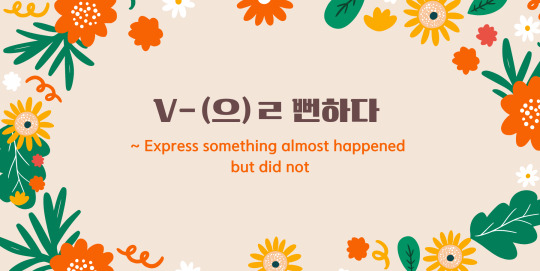
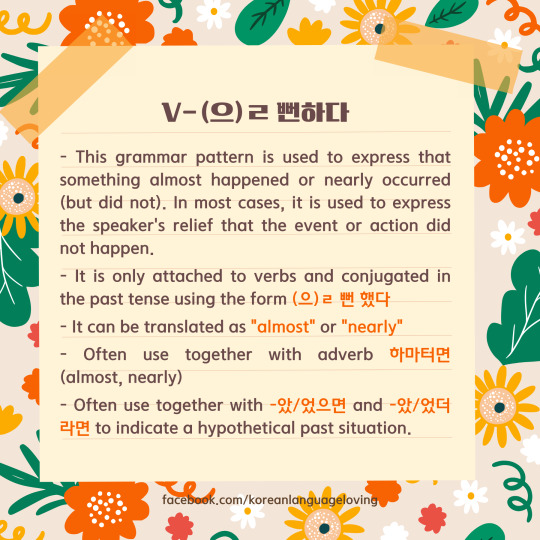
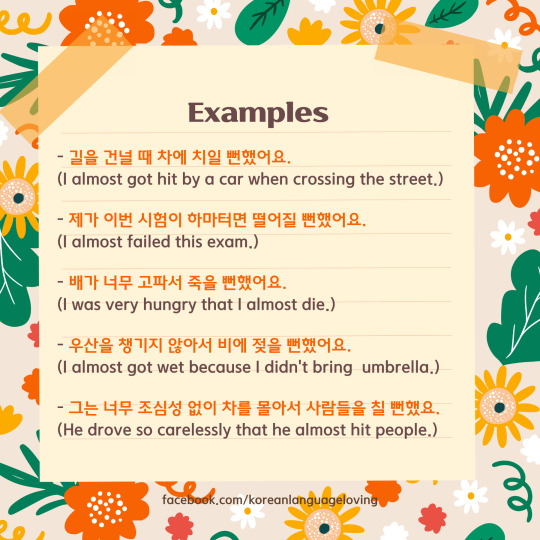
𝐊𝐨𝐫𝐞𝐚𝐧 𝐆𝐫𝐚𝐦𝐦𝐚𝐫: V-(으)ㄹ 뻔하다
✏️ 𝐔𝐬𝐚𝐠𝐞
- This grammar pattern indicates that something was on the verge of happening or almost occurred, but ultimately did not take place. Typically, it is used to convey the speaker's sense of relief that the event or action did not happen.
E.g.
길이 미끄러워서 넘어질 뻔했어요.
(Because the road was slippery, I almost fell.)
-> The speaker is describing a situation where they were walking on a slippery road and almost fell but didn't
✏️ 𝐒𝐩𝐞𝐜𝐢𝐚𝐥 𝐍𝐨𝐭𝐞𝐬
(1) Because this grammar pattern describes an action that almost happened but ultimately did not, it is therefore typically conjugated in the past tense using the form (으)ㄹ 뻔 했다.
E.g.
영화가 너무 슬퍼서 하마터면 여자 친구 앞에서 울 뻔했어요.
(Because the movie is so sad, I almost cried in front of my girlfriend.)
(2) It is often used together with the adverb 하마터면 (almost, barely, nearly)
E.g.
하마터면 감기가 들뻔했어요.
(I almost caught a cold.)
(3) This expression is often used following constructions that indicate hypothetical past situations such as -았/었으면 and -았/었더라면
E.g.
조금만 늦었으면 기차를 못 탈 뻔 했어요.
(If I had been a little late, I wouldn't have been able to catch the train.)
네가 전화하지 않았더라면 약속을 잊어버릴 뻔했어요.
(If you hadn't called me, I would have forgotten the appointment.)
(4) This expression can also be used to exaggerate past events. In such cases, the form "아/어서 죽을 뻔하다" (literally "almost died because of [something]") is frequently used to emphasize the situation.
E.g.
너무 무서워서 죽을 뻔했어요.
(I was so scared that I almost died.)
✏️ 𝐂𝐨𝐧𝐣𝐮𝐠𝐚𝐭𝐢𝐨𝐧
~ㄹ 뻔하다 Is used when the verb stem ends with a vowel.
울다 -- 울 뻔하다 = almost cried
잠을 자다 -- 잠을 잘 뻔하다 = almost slept
~을 뻔하다 Is used when the verb stem ends with a consonant.
죽다 -- 죽을 뻔하다 = almost died
넘다 -- 넘을 뻔하다 = almost passed
✏️ 𝐌𝐨𝐫𝐞 𝐄𝐱𝐚𝐦𝐩𝐥𝐞𝐬
1. 너무 피곤해서 지하철에서 졸다가 내릴 곳을 지나칠 뻔했어요
(Because I was too tired and dozed off on the subway, I almost missed my stop.)
2. 공항에 가는데 길이 너무 막혀서 비행기를 놓칠 뻔했어요.
(Because there was so much traffic on my way to the airport, I almost missed my flight.)
3. 집에 오다가 바람이 너무 세게 불어서 날아갈 뻔했어요.
(While coming home, the wind was blowing so strongly that I almost got blown away.)
4. 다른 사람과 부딪혀서 커피를 쏟을 뻔했어요.
(I almost spilled my coffee because I bumped into someone else.)
5. 누가 쓰레기통에 불이 안 꺼진 담배를 버려서 불이 날뻔했어요.
(Someone threw away a cigarette butt that was not completely extinguished in the trash can, and it almost caused a fire.)
#KoreanGrammar #KoreanLanguage #studywithme
🌸 🌼 🌻
Support me at: https://koreanlanguageloving.my.canva.site/
#Korean Grammar#Grammar Rules#Learn Korean#Study Korean#Korean Language#korean langblr#learning Hangul#한국어공부중#한국어 공부하기#한국어 배우기#한국어#한국어 어휘#한국어 공부#한국어문법#한국어 문법
29 notes
·
View notes
Text
love having colorful notes. really helps my fish brain maintain focus
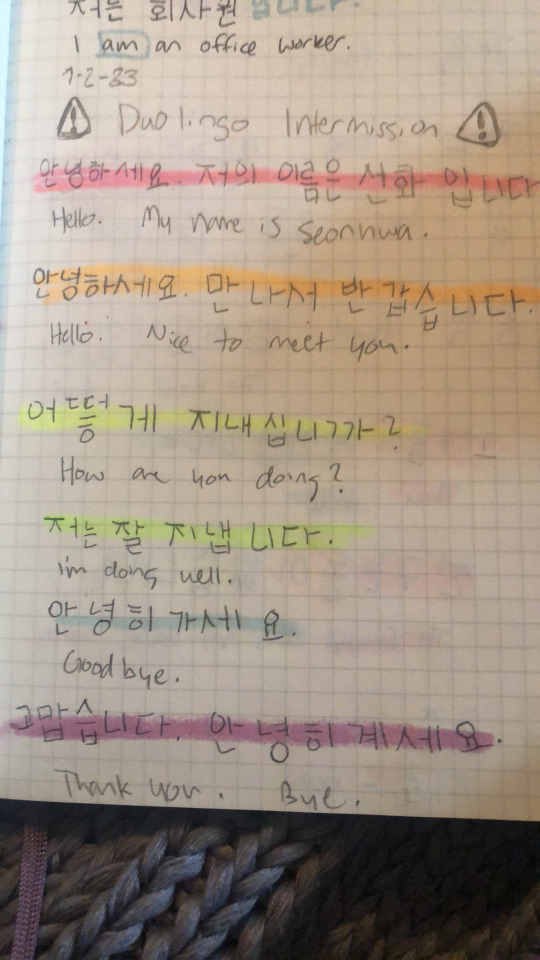
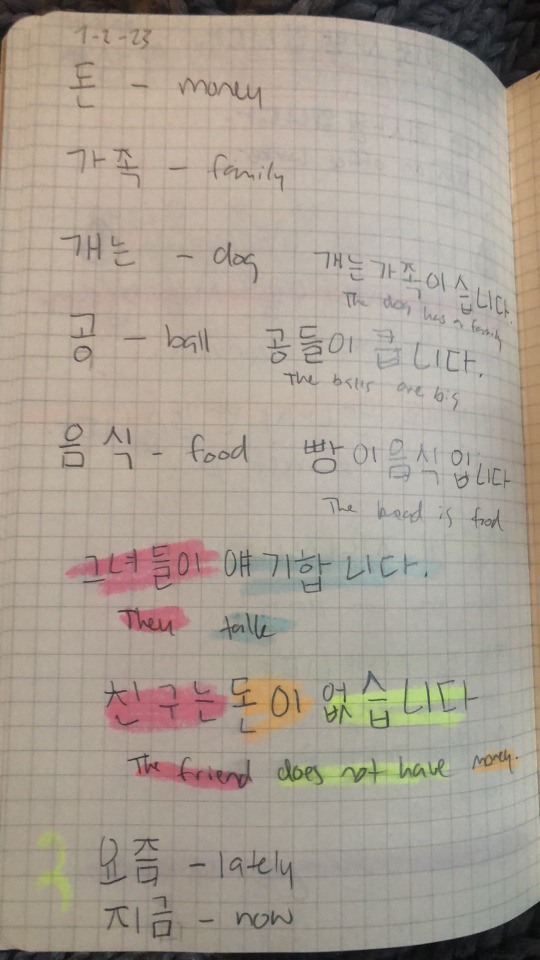
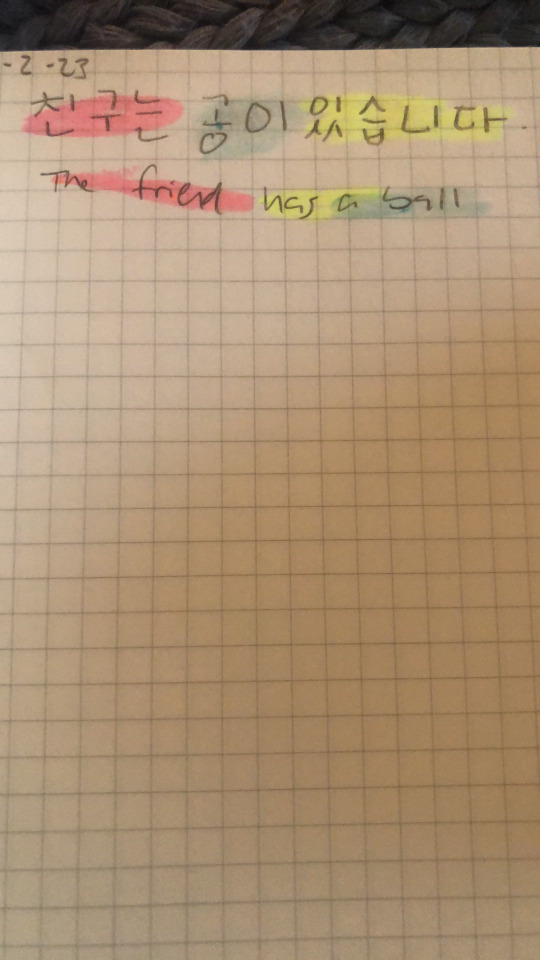
#language#learn korean#learning korean#learning languages#study korean#studying korean#hangul#learning hangul#study hangul#study languages#korean language#korean vocabulary#language learning#한국어
0 notes
Text
Yippee new qsmp language means a new language to learn that I will inevitably give up in like two months! (I do not have the attention span for a second language T-T)
#im at least going to try to fully learn hangul#ive always been like this tbh even before qsmp#ive taken so many languages in school plus tried to learn them outside of it#i just dont have the attention span to stick to one their all so interesting#qsmp
10 notes
·
View notes
